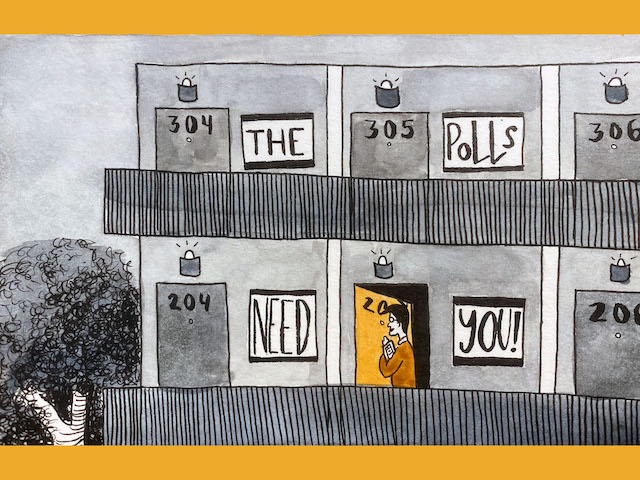Election day is less than a month away. With the rising COVID-19 numbers across the nation, we will face a new voting reality marked by masks, social distancing and mail-in ballots.
Despite the health precautions, our polling booths leave middle-aged and older poll workers most vulnerable to COVID-19. To solve this problem, UT students who are not at risk should staff the polls around campus or in Travis County during the early voting session and on Election Day.
International relations and global studies sophomore Hana Bredstein signed up to become a poll worker for this very reason.
“The average age of poll workers is very old,” Bredstein said. “Obviously, it makes people feel unsafe, and they don’t want to be going out with COVID.”
According to a report by the U.S. Election Assistance Commission, 58% of workers were over 60 years old in the 2018 general election. This population faces a higher risk of developing complications from COVID-19, and should not risk their health and safety to work at the polls this year.
Polling sites are already facing a worker shortage because usual poll workers are leaving for health-related risks. There are even worries about poll sites shutting down because of a national shortage of poll workers. Closing poll sites will have a detrimental effect on voter turnout, especially for working class voters who work longer hours or do not have a vehicle to drive to another voting site.
Plan II and Middle Eastern studies sophomore Saffie Kaplan is working as a poll judge this year, and has worked on the polling staff since the 2018 election.
“Since we are probably looking at having the highest voter turnout that any of us have seen in our lifetimes, we don’t want to be closing polls,” Kaplan said.
Although many voters may be opting for mail-in votes, UT is a hot spot for student engagement and voter turnout. UT received the national distinction for Most Improved Voting Rate among large public universities after the student voting population shot up 37.3% from 2014.
Government freshman Joseph Kudler, who is the chair of the UT voting student organization Hook the Vote, spoke on the importance of student voting turnout and polling sites.
“(Working the polls) gives people a good point of view into the process itself,” Kudler said. “I mean, you see all people of different creeds and backgrounds going in to vote, and it is really essential to democracy that we make sure we have a maximum amount of polling locations.”
Working at the polls is simple. Responsibilities include checking voter registration cards from voters, guiding the voters through the polling booths and the political process and teaching people how to use the voting equipment. Travis County even pays students for their services.
“It will be super important for younger people who are less at risk for the virus to step in this year in order to protect our older generations,” Kaplan said.
Given the importance of polling stations this year and the dangerous health risks associated with the pandemic, UT students must take on the responsibility of working the polls and protecting the most vulnerable members of their communities.
Barker is a government sophomore from Arlington, Texas.





















